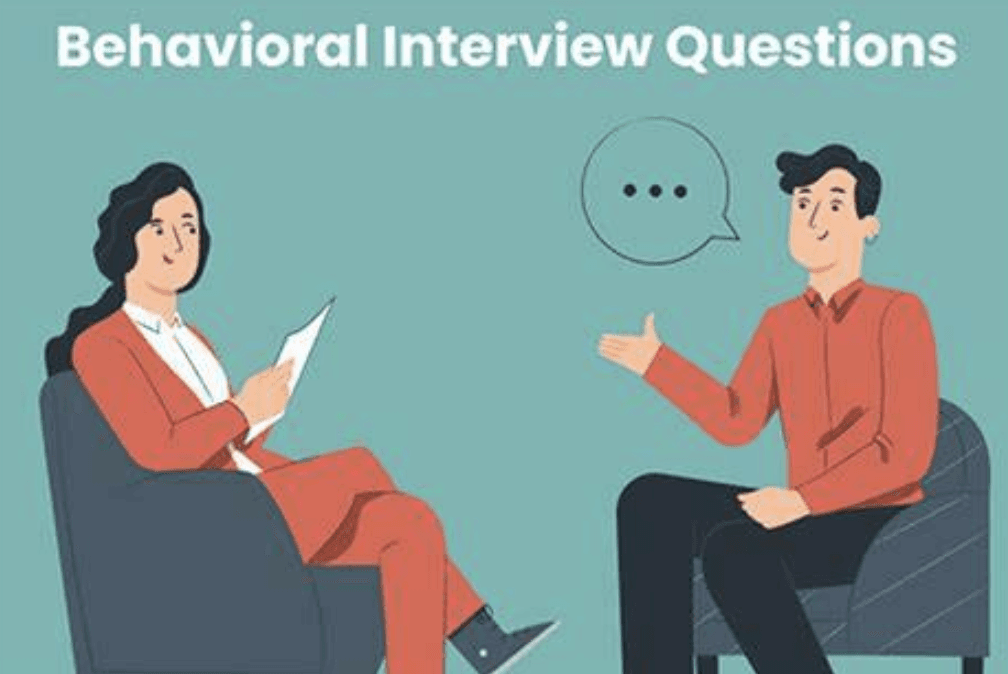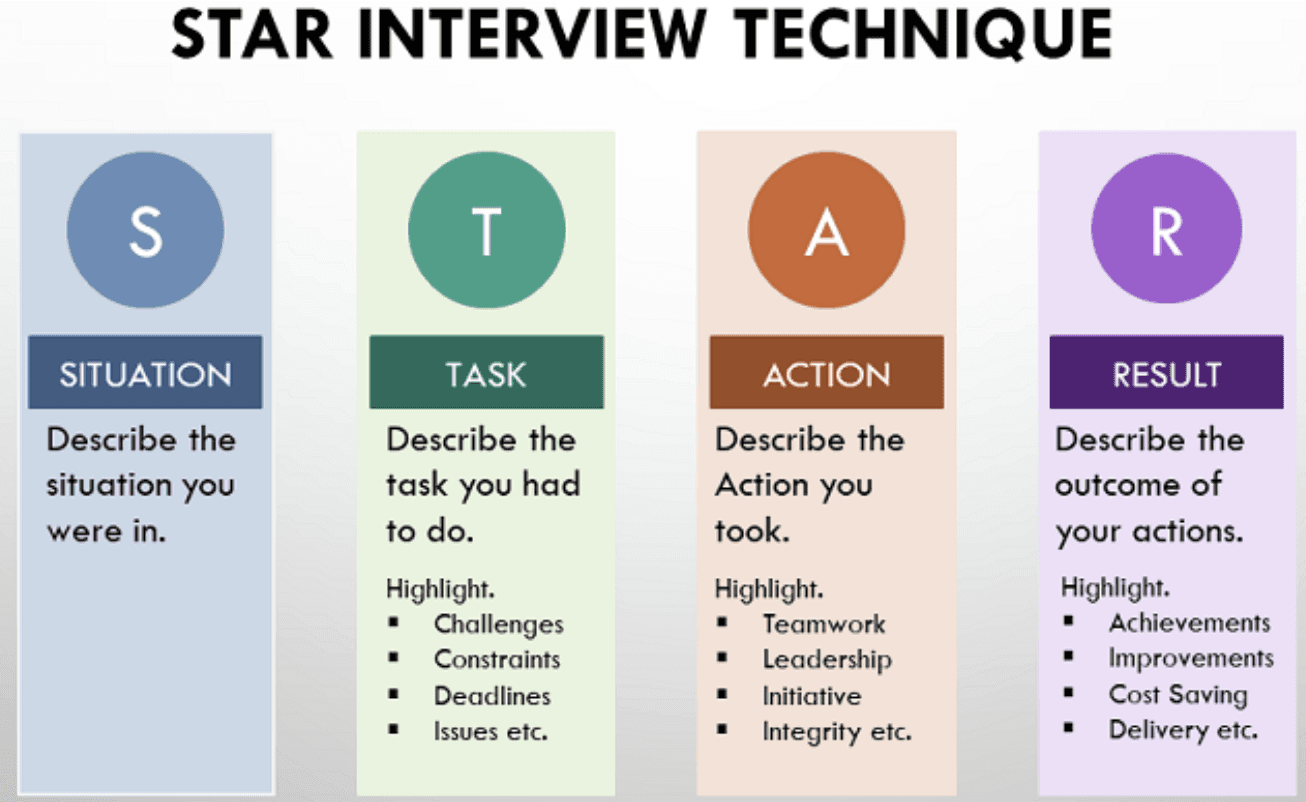
Behavioral interviews are designed to evaluate how you’ve managed specific situations in the past, giving employers insights into your potential performance. These questions focus on key skills like problem-solving, teamwork, adaptability, and leadership—qualities essential in almost any workplace.
The STAR method (Situation, Task, Action, Result) is a proven framework to answer these questions with clarity and impact. By organizing responses into these four steps, you’ll create structured answers that demonstrate your skills without sounding rehearsed. Sensei AI can support your interview preparation by offering real-time response suggestions, drawing from your resume and the specific role, to help you articulate your strengths effectively. Below, we’ll walk through 25 common behavioral questions, complete with sample answers and breakdowns of what makes each response effective.

25 Common Behavioral Interview Questions and Sample Answers
Questions 1-10: Teamwork and Leadership

1. Tell me about a time you worked in a team.
Explanation: Teamwork questions assess your collaboration and communication skills. A good answer should show your ability to contribute effectively in a group setting.
Sample Answer: In my last role, I worked on a project to launch a new product. As part of a cross-functional team, I helped organize regular check-in meetings, ensuring each member knew their tasks and deadlines. I also offered support to a colleague who was struggling with part of the workload. This cohesive approach enabled us to launch the product on schedule, which exceeded our initial sales target by 25%.
2. Describe a leadership challenge you faced.
Explanation: Leadership questions focus on your capacity to handle responsibility, guide others, and solve team challenges.
Sample Answer: In my previous job, I was promoted to lead a team during a crucial project phase. A team member was falling behind, affecting our timeline. I held a one-on-one meeting to understand their challenges, reassigned some tasks to other team members, and provided extra support. This helped us meet our deadline and fostered a positive team environment.
3. How do you handle conflicts within a team?
Explanation: Employers want to know if you can resolve conflicts constructively. Your response should demonstrate open communication and respect.
Sample Answer: In a past role, two colleagues had opposing views on a project direction. I facilitated a discussion where each person could express their viewpoint openly, then helped them identify common ground. This approach led to a productive compromise, strengthening team morale and improving our project outcome.
4. What role do you usually take in team projects?
Explanation: This question helps the interviewer understand how you fit into team dynamics. A balanced answer will highlight adaptability and responsibility.
Sample Answer: I often find myself acting as a coordinator, ensuring everyone has the information they need to move forward. For instance, in a recent project, I set up a system to track each member’s progress, which helped us meet our objectives efficiently and ensured everyone felt supported.
5. Share an experience where you had to motivate others.
Explanation: Motivational skills indicate your ability to inspire and uplift team members, a valuable trait in leadership.
Sample Answer: Our team was experiencing low morale during a demanding quarter. I suggested we set weekly goals to break down tasks into manageable steps. I also organized a team meeting to celebrate small wins. This shift in focus improved motivation, and by the end of the quarter, we exceeded our target by 15%.
6. Have you ever had to give constructive feedback?
Explanation: Constructive feedback is essential for growth. Show how you balance honesty with encouragement.
Sample Answer: One of my team members struggled with meeting deadlines, which impacted our projects. I approached the situation by acknowledging their strengths first, then discussed specific areas for improvement. We developed a timeline together to support their progress, and their performance improved significantly.
7. Describe a time when you collaborated with someone with a different work style.
Explanation: Effective collaboration often involves adjusting to others’ styles. A strong answer shows respect and adaptability.
Sample Answer: A colleague preferred a structured, detailed approach, while I was more flexible. We agreed to set clear project milestones, which gave me room to work creatively while allowing them the structure they preferred. This cooperation improved our project’s success.
8. How do you ensure effective communication in a team?
Explanation: Communication skills are crucial in a team setting. Employers value clarity and proactive information-sharing.
Sample Answer: I prioritize regular updates to keep everyone informed. In my last project, I implemented a weekly status report system, which improved accountability and helped us identify and solve issues early.
9. Describe a time when you took the initiative.
Explanation: Initiative reflects problem-solving and leadership skills, showing your ability to act independently when necessary.
Sample Answer: In a recent project, I noticed that team members were unclear on their roles, leading to delays. I took the initiative to create a task assignment chart, which brought structure and allowed us to complete the project on time.
Questions 11-20: Problem-Solving and Conflict Resolution

11. Describe a situation where you had to solve a difficult problem.
Explanation: Problem-solving skills are essential in most roles. A good response shows your analytical skills and resilience.
Sample Answer: We noticed a drop in customer satisfaction due to a recurring issue with our product. I analyzed customer feedback and collaborated with the production team to identify the root cause. We implemented additional quality checks, and customer satisfaction improved by 20%.
12. How do you prioritize tasks when facing a challenge?
Explanation: This question reveals your time management and decision-making skills. A concise, organized answer is ideal.
Sample Answer: I start by assessing urgency and impact. Recently, I was juggling multiple projects, so I focused on high-impact tasks first, allowing me to meet all deadlines without compromising quality.
13. Give an example of a failure you turned into a learning opportunity.
Explanation: Failures can highlight your growth and self-awareness. Explain what you learned and applied afterward.
Sample Answer: Early in my career, I missed a project deadline due to underestimating the time required. I analyzed my mistakes, adopted time-tracking tools, and improved my planning skills. This experience taught me to set more realistic goals.
14. Tell me about a time you made a quick decision.
Explanation: This question assesses decisiveness and adaptability. Be sure to show confidence in your choice.
Sample Answer: During a client presentation, our software crashed. I quickly suggested continuing with a backup plan and walked the client through the remaining aspects manually. The client appreciated our flexibility, and we secured the deal.
15. Describe a time you faced a tight deadline.
Explanation: Tight deadlines are common in the workplace. Your answer should demonstrate efficiency and resilience.
Sample Answer: On a project with last-minute changes, I prioritized key deliverables and adjusted the schedule. By focusing on essentials and collaborating closely with my team, we met the revised deadline without compromising quality.
16. How do you handle stress and pressure?
Explanation: This question requires you to demonstrate self-management and resilience under pressure.
Sample Answer: I usually minimize stress by planning and allocating tasks efficiently. When under pressure, I break down tasks into manageable steps and maintain open communication, enabling me to stay calm and deliver on time.
17. Tell me about a time you made a mistake. How did you handle it?
Explanation: This question assesses accountability and problem-solving after a mistake.
Sample Answer: During a project, I misunderstood the client’s needs, leading to a first draft that didn’t meet expectations. I took responsibility, clarified the requirements, and made the necessary adjustments. The client appreciated our honesty and prompt response.
18. Give an example of a time you disagreed with a coworker.
Explanation: Handling disagreements is essential in teamwork, so your answer should show openness to communication and compromise.
Sample Answer: In a project, a coworker and I had differing opinions on direction. I shared my perspective and encouraged them to explain theirs. Through mutual understanding, we developed a solution that incorporated both views, leading to a successful outcome.
19. Describe a challenging project you managed.
Explanation: This question highlights your project management skills and ability to handle complexity.
Sample Answer: I managed a large-scale event with tight deadlines and limited resources. I created a detailed timeline and held regular check-ins to monitor progress, ensuring the project was completed on time and met expectations.
20. How do you approach solving conflicts with clients?
Explanation: Your answer should emphasize client relationship management and problem-solving skills.
Sample Answer: When a client was dissatisfied with our solution, I first listened to their feedback to fully understand their needs. I then proposed a revised approach and maintained transparency, which led to a final solution they were very pleased with.
Questions 21-25: Adaptability and Learning from Failure
21. Tell me about a time you had to adapt to change.
Explanation: Adaptability questions assess your comfort with change and your ability to respond quickly.
Sample Answer: The company introduced a new technology I was unfamiliar with. I immediately started self-learning and attended related training, adapting quickly and helping the team complete the transition faster.
22. Describe a failure and what you learned from it.
Explanation: This question highlights your reflective skills and growth potential.
Sample Answer: During a project, I overestimated my capacity, leading to delays. This experience taught me to evaluate my schedule more realistically and leverage team collaboration.
23. How do you handle a situation when you don't have all the information?
Explanation: This tests your decision-making and ability to act in ambiguity.
Sample Answer: When faced with incomplete information, I analyze available resources and make informed assumptions, while also reaching out to relevant contacts for additional details to minimize risks.
24. Share a time when you had to learn a new skill quickly.
Explanation: Quick learning is valuable when adapting to new environments and challenges.
Sample Answer: A new project required a design software I hadn’t used before. I dedicated time to tutorials and quickly gained the basic skills needed, completing the project successfully.
25. Tell me about a time you went above and beyond.
Explanation: This question reveals your commitment and proactive attitude.
Sample Answer: At the final stage of a project, we discovered extra work was needed. I volunteered to take on the additional tasks, ensuring the project’s success, which impressed the client.
Explore Interview Copilot for Behavioral Interviews
Tips for Crafting Effective Answers

Using the STAR Method:
The STAR method helps structure your responses. Begin by setting the Situation and explaining the Task at hand. Then, detail the Action you took and the Result you achieved. STAR helps keep your answers clear, organized, and impactful.Tailoring Responses:
Always try to relate your answers back to the role’s responsibilities and the company’s values. Researching the company beforehand will help you emphasize the qualities they’re seeking.Avoiding Common Pitfalls:
Avoid giving vague or unfocused answers. Instead, stay specific and avoid embellishing your experiences. Authenticity goes a long way in making your responses credible.
Try Interview Copilot for Free
Conclusion
Behavioral questions can be challenging, but with preparation and the STAR method, you can tackle them effectively. Sensei AI is a valuable tool that offers real-time, personalized assistance, helping you stay focused and articulate. Practice these answers, tailor them to the job, and approach each question with clarity and honesty.
Try Sensei AI Now
FAQ
What are the top 5 behavioral interview questions?
Typical questions cover key skills, like:
Teamwork: “Describe a time you worked with a team.”
Conflict Resolution: “How do you handle disagreements at work?”
Leadership: “Share an experience leading a team or project.”
Problem-Solving: “Tell me about a challenging problem you solved.”
Adaptability: “How did you handle a major change at work?”
What is the STAR method when interviewing?
The STAR method breaks responses into: Situation, Task, Action, and Result. It helps you provide clear, relevant answers.
How can I impress in a behavioral interview?
Focus on using specific examples that align with the job, highlight your growth from challenges, and show enthusiasm for the role.
What is a typical behavioral interview question?
One common question is, “Describe a challenging situation and how you resolved it,” which tests problem-solving and resilience.
Try Sensei AI Demo

Abisola Ogundiran
Abisola is a dedicated content writer for Sensei AI, bringing a proven track record of delivering exceptional results to every piece. With a focus on collaboration, responsiveness, and client satisfaction, Abisola takes pride in producing high-quality content that helps job seekers navigate the world of interviews with confidence. Their commitment to fostering positive working relationships shines through in each article, ensuring that readers get the most insightful and actionable advice possible.
Learn More
Tutorial Series: Introducing Our New Chrome Extension Listener
7 Common Interview Mistakes and How to Avoid Them
How to Introduce Yourself in an Interview (With Tips & Examples)
Online Interview Preparation: What You Really Need to Know
Cross-Cultural Interview Tips to Land Global Jobs
Enhance Your Professional Skills: A Guide to Thriving in 2025
The Perfect Resume Format: Proven Tips to Get Noticed and Get Hired (2025 Guide)
Why Your Resume Keeps Getting Ghosted (And How to Fix It for 2025 ATS)
Why You’re Failing Interviews (And How to Finally Get It Right)
Master LinkedIn Endorsements: Boost Your Profile & Attract Recruiters
Sensei AI
hi@senseicopilot.com
